Cristall.club (Free Instructions) - Removal Guide
Cristall.club Removal Guide
What is Cristall.club?
Cristall.club – a deceptive website that attempts to trick you into subscribing to persistent ads
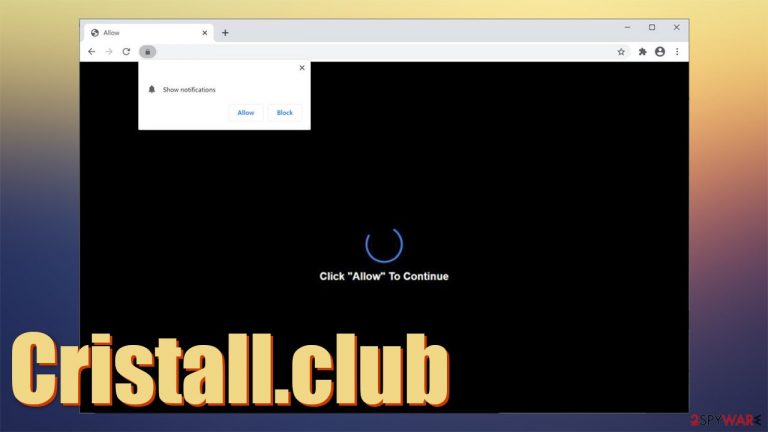
Cristall.club is a website that is used for social engineering attacks. Regardless of which browser is being used (Google Chrome, Mozilla Firefox, Safari, or MS Edge), users would be presented with a notification prompt immediately upon site entry, asking them to press the “Allow” button. In the background, they would be actively encouraged to do so by various page backgrounds.
Those who listen to the encouragement and subscribe to the page's notifications would soon see that their desktops begin to be filled with intrusive popup ads, typically displayed at the bottom-right corner of the screen. This annoying activity can repeat at random intervals or be extremely persistent. The links inside these ads could lead to malicious and other scam/phishing sites, so it is important not to click on them.
| Name | Cristall.club |
|---|---|
| Type | Push notification virus, Adware |
| IP address | 67.212.184.150 |
| Distribution | As soon as the “Allow” button is pressed upon site entry |
| Symptoms | Popup ads start showing up on the bottom-right corner of the screen at random intervals |
| Dangers | Clicking on links that are embedded within the notification prompt, exploring the sites these links bring to, or downloading files can be particularly dangerous – users can get infected with malware, suffer from financial losses or privacy issues |
| Elimination | To make the website stop displaying notifications to you, you need to access the site permission section via your web browser settings – you can find more details below |
| Further steps | Redirects and ads might indicate adware infection, so you should check your system with anti-malware, clean your browsers, and attempt to fix virus damage with a repair tool FortectIntego |
There are thousands of similar websites trying to do the same thing all over again – scam users. These domains are created at extremely high rates, and, despite Google's and other tech giants' efforts to tackle the scam problem, it continues to damage users' online activities. Some examples include:
While these sites are likely to be crafted by different fraudster groups, the scheme's creation is rather lazy. The only component they rely on is the scam message or a picture provided in the background (unfortunately, this minimal effort is enough to tick some users regardless).
Just like with any other social engineering[1] schemes, attackers rely on familiar and well-known attributes. Users might encounter different versions of the Cristall.club scam. The most common one simply shows a black page with the following text:
Click “Allow” To Continue
This statement implies that some type of background content is available to view. However, even clicking “Block” will not accomplish anything, and visitors will simply be reconnected to the same page or rerouted to other potentially dangerous places.
Additionally, the links inside popups can be hazardous, as they might result in the installation of malware or monetary losses due to scam claims. Thus, never click “Allow” and instead leave the website fully by closing down the tab the page is shown on. If you have already allowed push notifications in, it is not a big problem as long as you don't click on the ads and follow the Cristall.club removal guide we provide below.

While most users access this website after being redirected from somewhere else (for example, after accidentally clicking on a link or being automatically rerouted), persistent activities of such type might indicate that the computer is infected with adware.[2] Now, keep in mind that adware is software that is installed on your computer in one way or another, while the so-called Cristall.club virus is not.
The notifications that you are seeing are there in the first place because of permission from your side. In order to permanently remove Cristall.club ads from your desktop, you need to access the settings panel of your browser. For that, we recommend following the instructions posted at the bottom of the article.
When it comes to adware, you should take your time and check your computer for it, regardless if ads are persistent or not. Some ad-supported software can be extremely sneaky and difficult to detect. Thus, you should perform a full system scan with SpyHunter 5Combo Cleaner, Malwarebytes, or another reputable security tool. For best results, we also recommend using FortectIntego.
Online scams are common, so learn to avoid being tricked
First of all, we would like to point out the importance of picking the correct sources for your software downloads. Places like torrent or crack sites are those to be avoided the most, as they are perfect breeding grounds for all types of nasties, including ransomware, Trojans, etc.
Even when dealing with seemingly known distribution sites such as Softonic, you should be careful. According to research, all freeware sites are bundling software, so you might easily install something you never intended in the first place. Thus, always read the installation instructions carefully, untick all checkboxes, and opt for Advanced/Custom settings.
When speaking of online scams you might encounter randomly, here are a few that experts[3] say you should take into account:
- Fake Flash Player installers;
- Fake surveys offering expensive gifts;
- “Free” streaming services asking for your credit card details or other personal information;
- Earn-money-quick scams that ask you to invest a small sum of money for extreme profit days later;
- Spoofing websites that imitate legitimate ones (always look at the exact URL!).
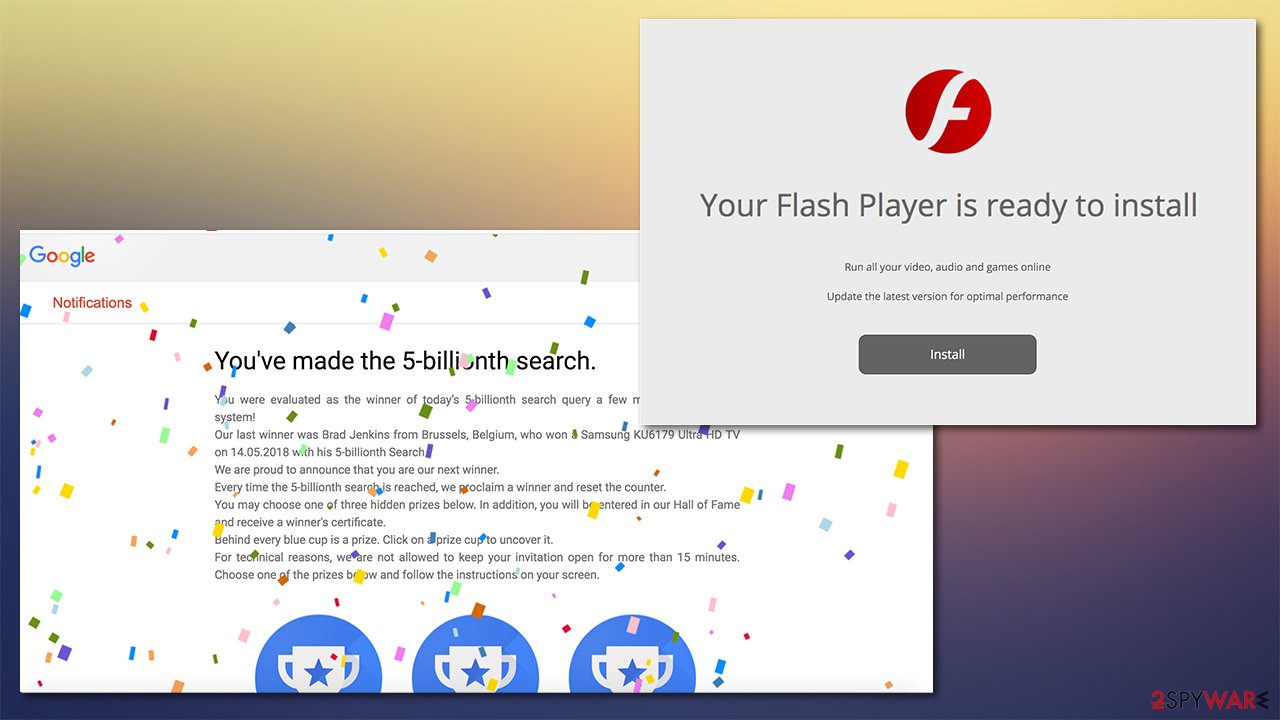
Being careful is also not enough – you need to make sure that your device is protected with a robust security tool that includes real-time protection feature.
You can easily stop Cristall.club notifications
Before you proceed with Cristall.club removal, you should check your device for adware or other potentially unwanted programs. This is especially important if you clicked on links, explored websites after being redirected, or downloaded something to your device.
While you can look for PUPs manually (we provide the instructions below), we also recommend you perform a full system scan with SpyHunter 5Combo Cleaner or Malwarebytes, followed up by a scan with FortectIntego for system file remediation. If nothing was found either manually or automatically, you should simply remove Cristall.club notifications from your desktop.
For that, you should access browser settings and deny the site permission to show you ads. Below you will find instructions for each of the most popular browsers. While you are at it, you should also clean browsers' cookies and other web data.
Getting rid of Cristall.club. Follow these steps
Stop browser notifications
You can stop the site from displaying notifications and ads in a simple way:
Remove unwanted notifications from Google Chrome (desktop):
- Open Google Chrome browser and go to Menu > Settings.
- Scroll down and click on Advanced.
- Locate Privacy and security section and pick Site Settings > Notifications.
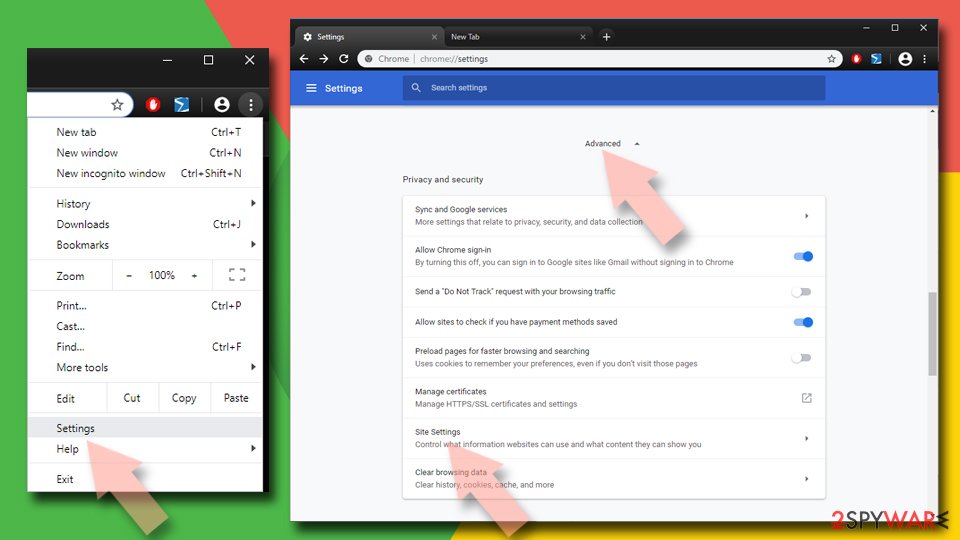
- Look at the Allow section and look for a suspicious URL.
- Click the three vertical dots next to it and pick Block. This should remove unwanted notifications from Google Chrome.

Remove unwanted notifications from Google Chrome (Android):
- Open Google Chrome and tap on Settings (three vertical dots).
- Select Notifications.
- Scroll down to the Sites section.
- Locate the unwanted URL and toggle the button to the left (Off setting).

Remove unwanted notifications from Mozilla Firefox:
- Open Mozilla Firefox and go to Menu > Options.
- Click on Privacy & Security section.
- Under Permissions, you should be able to see Notifications. Click the Settings button next to it.
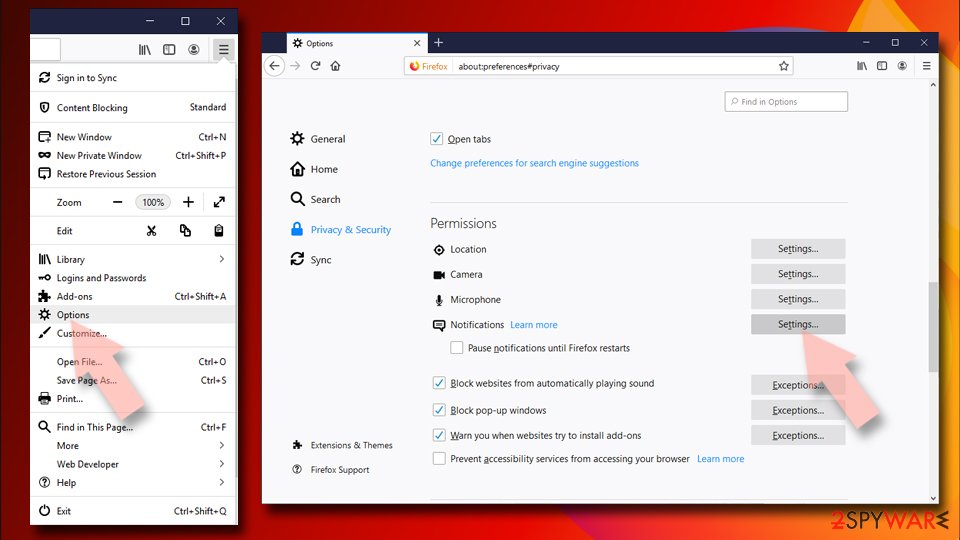
- In the Settings – Notification Permissions window, click on the drop-down menu by the URL in question.
- Select Block and then click on Save Changes. This should remove unwanted notifications from Mozilla Firefox.

Remove unwanted notifications from Safari:
- Click on Safari > Preferences…
- Go to the Websites tab and, under General, select Notifications.
- Select the web address in question, click the drop-down menu and select Deny.

Remove unwanted notifications from MS Edge:
- Open Microsoft Edge, and click the Settings and more button (three horizontal dots) at the top-right of the window.
- Select Settings and then go to Advanced.
- Under Website permissions, pick Manage permissions and select the URL in question.
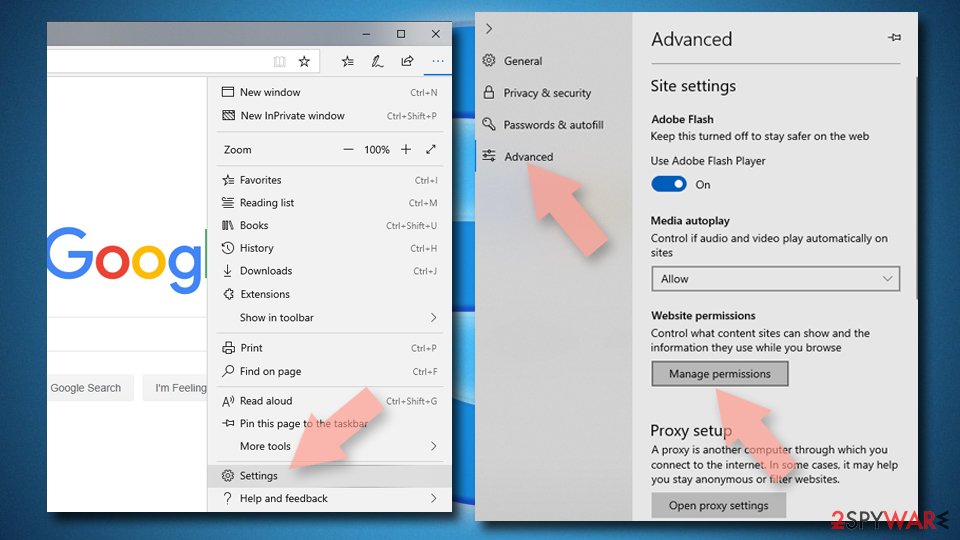
- Toggle the switch to the left to turn notifications off on Microsoft Edge.
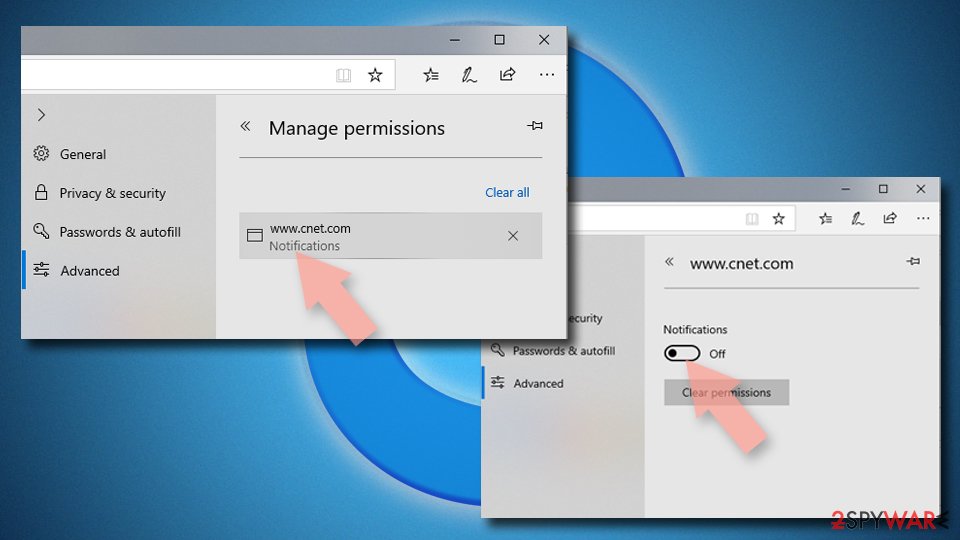
Remove unwanted notifications from MS Edge (Chromium):
- Open Microsoft Edge, and go to Settings.
- Select Site permissions.
- Go to Notifications on the right.
- Under Allow, you will find the unwanted entry.
- Click on More actions and select Block.

Remove unwanted notifications from Internet Explorer:
- Open Internet Explorer, and click on the Gear icon at the top-right of the window.
- Select Internet options and go to the Privacy tab.
- In the Pop-up Blocker section, click on Settings.
- Locate web address in question under Allowed sites and pick Remove.

Uninstall from Windows
You can look for adware on Windows manually:
Instructions for Windows 10/8 machines:
- Enter Control Panel into Windows search box and hit Enter or click on the search result.
- Under Programs, select Uninstall a program.

- From the list, find the entry of the suspicious program.
- Right-click on the application and select Uninstall.
- If User Account Control shows up, click Yes.
- Wait till uninstallation process is complete and click OK.

If you are Windows 7/XP user, proceed with the following instructions:
- Click on Windows Start > Control Panel located on the right pane (if you are Windows XP user, click on Add/Remove Programs).
- In Control Panel, select Programs > Uninstall a program.

- Pick the unwanted application by clicking on it once.
- At the top, click Uninstall/Change.
- In the confirmation prompt, pick Yes.
- Click OK once the removal process is finished.
Delete from macOS
If you want to uninstall potentially unwanted applications from Mac, follow these steps:
Remove items from Applications folder:
- From the menu bar, select Go > Applications.
- In the Applications folder, look for all related entries.
- Click on the app and drag it to Trash (or right-click and pick Move to Trash)

To fully remove an unwanted app, you need to access Application Support, LaunchAgents, and LaunchDaemons folders and delete relevant files:
- Select Go > Go to Folder.
- Enter /Library/Application Support and click Go or press Enter.
- In the Application Support folder, look for any dubious entries and then delete them.
- Now enter /Library/LaunchAgents and /Library/LaunchDaemons folders the same way and terminate all the related .plist files.

Remove from Microsoft Edge
Delete unwanted extensions from MS Edge:
- Select Menu (three horizontal dots at the top-right of the browser window) and pick Extensions.
- From the list, pick the extension and click on the Gear icon.
- Click on Uninstall at the bottom.

Clear cookies and other browser data:
- Click on the Menu (three horizontal dots at the top-right of the browser window) and select Privacy & security.
- Under Clear browsing data, pick Choose what to clear.
- Select everything (apart from passwords, although you might want to include Media licenses as well, if applicable) and click on Clear.

Restore new tab and homepage settings:
- Click the menu icon and choose Settings.
- Then find On startup section.
- Click Disable if you found any suspicious domain.
Reset MS Edge if the above steps did not work:
- Press on Ctrl + Shift + Esc to open Task Manager.
- Click on More details arrow at the bottom of the window.
- Select Details tab.
- Now scroll down and locate every entry with Microsoft Edge name in it. Right-click on each of them and select End Task to stop MS Edge from running.

If this solution failed to help you, you need to use an advanced Edge reset method. Note that you need to backup your data before proceeding.
- Find the following folder on your computer: C:\\Users\\%username%\\AppData\\Local\\Packages\\Microsoft.MicrosoftEdge_8wekyb3d8bbwe.
- Press Ctrl + A on your keyboard to select all folders.
- Right-click on them and pick Delete

- Now right-click on the Start button and pick Windows PowerShell (Admin).
- When the new window opens, copy and paste the following command, and then press Enter:
Get-AppXPackage -AllUsers -Name Microsoft.MicrosoftEdge | Foreach {Add-AppxPackage -DisableDevelopmentMode -Register “$($_.InstallLocation)\\AppXManifest.xml” -Verbose

Instructions for Chromium-based Edge
Delete extensions from MS Edge (Chromium):
- Open Edge and click select Settings > Extensions.
- Delete unwanted extensions by clicking Remove.

Clear cache and site data:
- Click on Menu and go to Settings.
- Select Privacy, search and services.
- Under Clear browsing data, pick Choose what to clear.
- Under Time range, pick All time.
- Select Clear now.

Reset Chromium-based MS Edge:
- Click on Menu and select Settings.
- On the left side, pick Reset settings.
- Select Restore settings to their default values.
- Confirm with Reset.

Remove from Mozilla Firefox (FF)
Remove dangerous extensions:
- Open Mozilla Firefox browser and click on the Menu (three horizontal lines at the top-right of the window).
- Select Add-ons.
- In here, select unwanted plugin and click Remove.

Reset the homepage:
- Click three horizontal lines at the top right corner to open the menu.
- Choose Options.
- Under Home options, enter your preferred site that will open every time you newly open the Mozilla Firefox.
Clear cookies and site data:
- Click Menu and pick Settings.
- Go to Privacy & Security section.
- Scroll down to locate Cookies and Site Data.
- Click on Clear Data…
- Select Cookies and Site Data, as well as Cached Web Content and press Clear.

Reset Mozilla Firefox
If clearing the browser as explained above did not help, reset Mozilla Firefox:
- Open Mozilla Firefox browser and click the Menu.
- Go to Help and then choose Troubleshooting Information.

- Under Give Firefox a tune up section, click on Refresh Firefox…
- Once the pop-up shows up, confirm the action by pressing on Refresh Firefox.

Remove from Google Chrome
Make sure you clean your Google Chrome browsers appropriately, especially if adware was installed on your system:
Delete malicious extensions from Google Chrome:
- Open Google Chrome, click on the Menu (three vertical dots at the top-right corner) and select More tools > Extensions.
- In the newly opened window, you will see all the installed extensions. Uninstall all the suspicious plugins that might be related to the unwanted program by clicking Remove.

Clear cache and web data from Chrome:
- Click on Menu and pick Settings.
- Under Privacy and security, select Clear browsing data.
- Select Browsing history, Cookies and other site data, as well as Cached images and files.
- Click Clear data.

Change your homepage:
- Click menu and choose Settings.
- Look for a suspicious site in the On startup section.
- Click on Open a specific or set of pages and click on three dots to find the Remove option.
Reset Google Chrome:
If the previous methods did not help you, reset Google Chrome to eliminate all the unwanted components:
- Click on Menu and select Settings.
- In the Settings, scroll down and click Advanced.
- Scroll down and locate Reset and clean up section.
- Now click Restore settings to their original defaults.
- Confirm with Reset settings.

Delete from Safari
Remove unwanted extensions from Safari:
- Click Safari > Preferences…
- In the new window, pick Extensions.
- Select the unwanted extension and select Uninstall.

Clear cookies and other website data from Safari:
- Click Safari > Clear History…
- From the drop-down menu under Clear, pick all history.
- Confirm with Clear History.

Reset Safari if the above-mentioned steps did not help you:
- Click Safari > Preferences…
- Go to Advanced tab.
- Tick the Show Develop menu in menu bar.
- From the menu bar, click Develop, and then select Empty Caches.

How to prevent from getting adware
Stream videos without limitations, no matter where you are
There are multiple parties that could find out almost anything about you by checking your online activity. While this is highly unlikely, advertisers and tech companies are constantly tracking you online. The first step to privacy should be a secure browser that focuses on tracker reduction to a minimum.
Even if you employ a secure browser, you will not be able to access websites that are restricted due to local government laws or other reasons. In other words, you may not be able to stream Disney+ or US-based Netflix in some countries. To bypass these restrictions, you can employ a powerful Private Internet Access VPN, which provides dedicated servers for torrenting and streaming, not slowing you down in the process.
Data backups are important – recover your lost files
Ransomware is one of the biggest threats to personal data. Once it is executed on a machine, it launches a sophisticated encryption algorithm that locks all your files, although it does not destroy them. The most common misconception is that anti-malware software can return files to their previous states. This is not true, however, and data remains locked after the malicious payload is deleted.
While regular data backups are the only secure method to recover your files after a ransomware attack, tools such as Data Recovery Pro can also be effective and restore at least some of your lost data.
